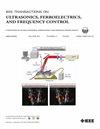Close Range and High-Resolution Detection of Vibration by Ultrasonic Wave Using Silicon-on-Nothing PMUTs
IF 3
2区 工程技术
Q1 ACOUSTICS
IEEE transactions on ultrasonics, ferroelectrics, and frequency control
Pub Date : 2024-08-26
DOI:10.1109/TUFFC.2024.3448481
引用次数: 0
Abstract
This article presents a novel method for close-range, high-resolution ultrasonic time-of-flight (ToF) ranging using piezoelectric micromachined ultrasonic transducers (PMUTs) operating below the device resonance in air. The proposed method involves cross correlation techniques to accurately detect the reflected echo signals despite the presence of ringdown signal interference. For the experiments, a high fill-factor array of silicon-on-nothing (SON) PMUTs was used to enhance the signal-to-noise ratio (SNR). A thorough investigation was conducted to determine the optimal driving frequency for below-resonance ToF ranging, to improve resolution and minimize detection errors. The results of the experiments showed that the system was able to accurately measure sub-利用无硅 PMUT 近距离、高分辨率检测超声波振动
本文提出了一种利用压电微机械超声换能器(PMUT)在空气中低于器件共振工作的近距离、高分辨率超声飞行时间(ToF)测距新方法。所提出的方法采用了交叉相关技术,可在存在降频信号干扰的情况下精确检测反射回波信号。在实验中,使用了高填充因子的无硅 (SON) PMUT 阵列来提高信噪比。为确定低于共振 ToF 测距的最佳驱动频率,以提高分辨率和最小化检测误差,进行了深入研究。实验结果表明,该系统能够精确测量距离 PMUT 阵列 13 毫米的金属板的微米级振动。该系统能够检测到峰峰位移小于 6 微米的目标物体振动和亚微米本底噪声。此外,最大检测振动频率可达 1 kHz。这项研究凸显了所提出的 ToF 测距方法在机器人和预测性维护等各个领域的非接触式振动监测应用中的潜力。
本文章由计算机程序翻译,如有差异,请以英文原文为准。
求助全文
约1分钟内获得全文
求助全文
来源期刊
CiteScore
7.70
自引率
16.70%
发文量
583
审稿时长
4.5 months
期刊介绍:
IEEE Transactions on Ultrasonics, Ferroelectrics and Frequency Control includes the theory, technology, materials, and applications relating to: (1) the generation, transmission, and detection of ultrasonic waves and related phenomena; (2) medical ultrasound, including hyperthermia, bioeffects, tissue characterization and imaging; (3) ferroelectric, piezoelectric, and piezomagnetic materials, including crystals, polycrystalline solids, films, polymers, and composites; (4) frequency control, timing and time distribution, including crystal oscillators and other means of classical frequency control, and atomic, molecular and laser frequency control standards. Areas of interest range from fundamental studies to the design and/or applications of devices and systems.

 求助内容:
求助内容: 应助结果提醒方式:
应助结果提醒方式:


